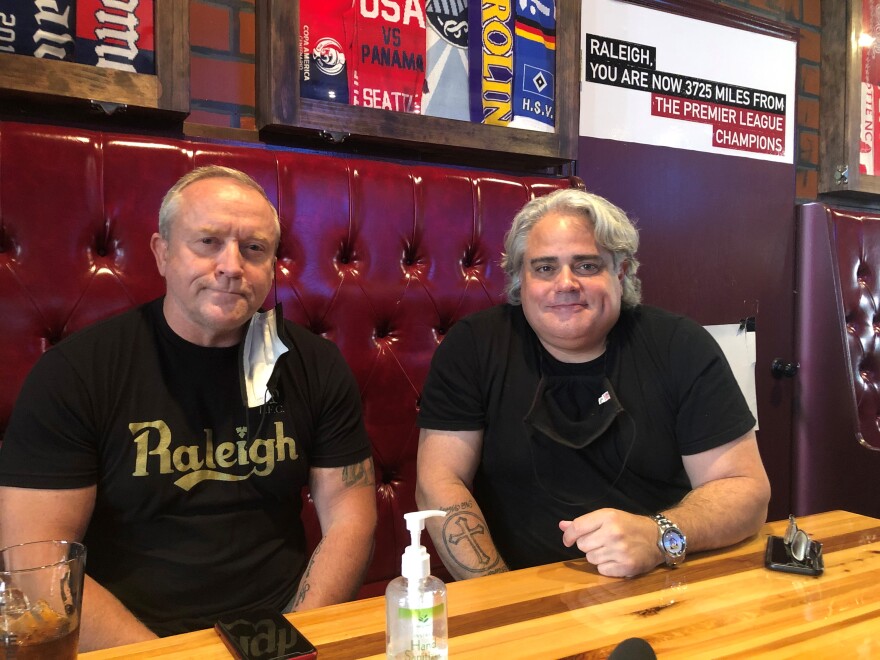Taari Coleman felt a palpable sense of unity when she joined a large group of people in Raleigh last May to protest the police killing of George Floyd.
"Like really empowered,” she said. “Connected to all the people around me, in a way that you hadn't really felt connected in a little while because we had all been so online and so isolated and so far from each other.”

Just days before this rally, Minneapolis Police Officer Derek Chauvin had held his knee on Floyd’s neck for over eight minutes. The murder sparked a summer of protests nationwide, including across North Carolina. Coleman recalls the peaceful start of that first demonstration in Raleigh.
"It was really cool to just march with people that you know about something that you believe in and that you know is wrong and that you want to see changed,” she said.
But things took a sudden turn when the demonstrators were confronted by Raleigh police officers that night.
"When the tear gas came out, it was really confusing to all of us because we couldn't understand why it was happening," she said.
Across the country, protesters and activists are marking one year since the beginning of a renewed fight for racial justice.
Last year's summer of unrest was marked with protests in cities and towns across the country — and the globe. Many were peaceful, others turned into highly public confrontations between police and protesters.
‘Just Mayhem’: Property Damage In Raleigh Sparked Concerns From Business Owners
In Raleigh, Darren Bridger co-owns The London Bridge Pub, one of the many downtown businesses whose property was damaged by rioters that first night of protests last year.
"All of our liquor bottles, they were all laying on the floor smashed, all out here smashed, the electronics were all smashed and taken, both the big picture windows were broken and the door and then...just mayhem in here,” described Bridger.
Nearby, Damon Butler's creative services company, Triangle Boulevard, leases space in the Montague Building just down the block from The London Bridge Pub.
"Everything from the restaurant to the law offices and our creative firm upstairs, those windows were all blown out, there was glass all over the floor shattered into a million pieces," said Butler.

Representative Tim Moore (R-Cleveland) was also in Raleigh that night. He witnessed some of the damage first-hand.
"I saw the CVS being lit on fire, I got several good breaths of tear gas unfortunately as that stuff traveled around because my condo is right downtown,” said Moore.Call For Anti-Riot Legislation
Moore said that unrest — as well as the Washington, D.C., riot by pro-Trump insurrectionists this past January — prompted him to try to revise North Carolina's anti-riot statute.
"I'm going to always, as an attorney, defend the right of someone to go out and advocate for their First Amendment rights," Moore said. "That's one of the most precious rights that we hold dear as a democracy, the right to speak freely, the right to protest, the right to even be rude at times, I mean that's just the way it is, but it's a different thing when somebody goes from that to destroying someone's property.”

Earlier this year, Moore, who serves as speaker of the North Carolina House — co-sponsored legislation that would stiffen the penalty for participating in a riot.
Current law defines a riot as an assemblage of three or more persons who engage in — or pose an imminent threat of — disorderly and violent conduct that results in bodily injury or property damage. When the damage amounts to less than $1,500, it's a Class 1 misdemeanor under existing law and Speaker Moore's bill.
But if the property damage amounts to $1,500 or more, the speaker's bill would raise the penalty from a Class H to a Class F felony.Policy Amid Ongoing Protests
Daniel Bowes, the director of policy and advocacy at the ACLU of North Carolina, says a felony conviction carrying the real prospect of active prison time could be a disproportionate punishment. He points out that damage of more than $1,500 can potentially be the cost of replacing one smashed window.
"It's a pretty extraordinarily low threshold considering the penalties that we're talking about,” said Bowes.
Moore's bill would also allow property owners to sue rioters for three times the value of the property damage and suspected rioters could be held for up to 48 hours upon arrest, something that now only happens in domestic violence cases and capital murders.
Bowes said the prospect of such penalties could deter someone from coming out to protest — be it in Raleigh or Elizabeth City, where people have been in the streets since last month, when Pasquotank County sheriff's deputies shot and killed another Black man, Andrew Brown Jr., as they attempted to serve warrants.
"And so you could easily see somebody, you know, rationally deciding that it is just not worth it for me to go to this protest in Elizabeth City or Wake County because the riot laws already give broad discretion because of how vague they are to law enforcement to call something a riot," Bowes said.
Protests For Black Lives Continue

As the country marks the one year since Floyd's death in Minneapolis, the movement to protest police violence toward Black individuals continues across the country.
In Raleigh, Mayor Mary Ann Baldwin has declared Tues. May 25 as a Day of Enlightenment in the city and Floyd's family in North Carolina is holding virtual rallies Tuesday and Wednesday to reflect on the change of the past year.
To Bowes as well as activist Victoria Smith, Moore's legislative efforts are misguided — aimed at clamping down on Black lives matter demonstrators instead of addressing their demands for more equitable treatment.
"I think it's just a scare tactic, honestly, just to try and scare protesters and scare us from being silent and being compliant,” said Smith.
The college-bound, 18-year-old high school senior co-founded the Wake County Black Student Coalition as part of the racial justice movement sparked by George Floyd's death. She joined the street protests in Raleigh last May and said she doesn't think the specter of stiffer criminal penalties will keep her from demonstrating in the future.
"I honestly don't think that that would deter me because at the end of the day, in my heart of hearts, I know this is wrong and this is unjust and so that shouldn't be a reason for me to stop fighting," Smith said.Bipartisan Support For Anti-Riot Legislation
It's not just Representative Moore and fellow Republicans who want to ratchet up the penalties for rioting. Moore's bill passed the House last week with the support of two dozen members of the minority party, including Democrat Abe Jones, a Raleigh resident and former Superior Court judge.
"The morning after they tore the hell out of downtown I drove down there,” said Jones. “It broke my heart because people tried to hijack what was largely peaceful demonstrations not just here but all across the country against Black men being shot unarmed by police which I consider to be a very, very important issue."
A major problem with existing state law and Speaker Moore's bill, according to the ACLU's Daniel Bowes, is its vagueness on what constitutes a riot and, more importantly, who is engaged in such conduct.
"And what we've seen is that when we give law enforcement broad discretion of who to arrest and how to charge them, that those decisions disproportionately harm people of color."

Alternative NC Anti-Riot Bill Offers Clarity And Criminal Justice Reform
The ACLU's Daniel Bowes said that's where a bill in the North Carolina Senate improves on existing anti-riot law and is far superior to Speaker Moore's house bill. That Senate bill was crafted by Danny Britt, a Republican representing Columbus and Robeson counties.
"As a criminal defense attorney as well as a former prosecutor I wanted the statutory language to more line up with what case law says, which, one, mere presence alone typically is not enough to sustain a charge, you must have an overt act,” said Britt.
Britt's bill also would stiffen the penalties for damaging property or injuring others during a riot but is much clearer than Speaker Moore's bill that the person charged must have caused the damage or injury.
Moore did back a Democrat-sponsored amendment to his bill, which added a line that mere presence at a riot alone is not enough for a conviction. But the bill language still lacks the clear causal link that the Senate bill contains. Under Moore's bill, a person could be found guilty of a felony for being engaged in a riot that results in at least $1,500 worth of property damage. And as a criminal defense attorney, Senator Britt said he would gladly represent someone charged under a law like that.
"If I had a client that was charged with rioting and that client was in a group of three or more people and somebody didn't actually see my client do anything other than be present, right, but yet there's damage caused by someone else, I'm going to go to trial every day of the week and I'm going to win," Britt said. "And if I lose I'm going to appeal it until the constitutionality of it is challenged."
While Representative Moore got backing from some Democrats in the House for his bill, Britt's Senate bill has buy-in from law enforcement associations, the ACLU of North Carolina and unanimous support from across the aisle.
The anti-riot provision in Senator Britt's legislation is just one part of a more comprehensive criminal justice reform measure. The bill also would create a database for tracking police officer misconduct and would amend state law on body cam footage, giving more immediate access to victims of police force or their relatives.

The Racial Justice Movement Behind The Riot
Even though it took months for the insurance to come through and to get the broken windows at The London Bridge Pub replaced, Darren Bridger harbors no resentment for the damage his business suffered during last year's demonstration.
"You gotta divorce the protests from the rioters but we can't divorce ourselves from why the protests were happening," Bridger said. "I fully support it, I mean, I still do."
Damon Butler, too, said that as he surveyed the damage at his office building after last year's protest in Raleigh, the shattered glass did nothing to obscure his view of the important issues at stake.
"My feeling was that we were focused on the big picture and what was happening in our country, not so much of what was happening to my business," Butler said.
Speaker Moore said his bill is meant to strike a balance between the right of assembly and law and order.
"I mean this bill, the way this bill was done was not to be divisive,” he said.
If that's true, then the Speaker might have to take a reflective pause and give the Senate legislation a closer look. The future of demonstrations in North Carolina — and interactions between police and protesters — could hang in the balance.
WUNC’s Celeste Gracia and Laura Pellicer contributed to this report.







